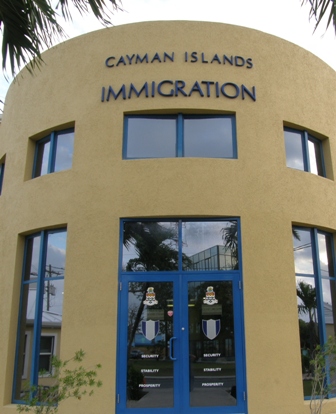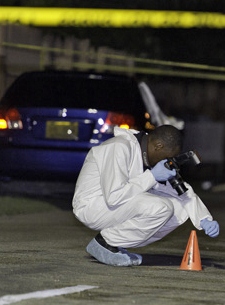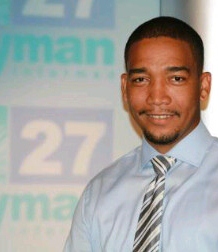Archive for May 15th, 2012
Customs recruits advised on importance of rules
Successfully completing the basic course were Sabrina Cane, Jordan Ebanks, Anthony Echenique, Joshua Grizzel, Arvid Harris, Scott Hydes, Sharissa McLaughlin, Sacha Miller, Philip Neale-Bodden, Eren Nicholson, Holly Schneider and Kruse Smith.
At the closing ceremony on Friday at Customs Headquarters Financial Secretary Kenneth Jefferson urged these “ambassadors” at airport and seaport arrival areas to remain polite, professional and knowledgeable when dealing with visitors as well as to continue learning. He said that being thorough with the rules has to go hand in hand with common sense and a good grasp of the reason the rules are applicable.
Carlon Powery, the collector of customs, said the recruits' impressive performance during the training augured well for their continuing progress on the job.
“Customs can be a truly exciting career. Make the department the best it can be,” he said, adding that they were joining the team at a time when major initiatives are underway,
A team of 14 people from the department, plus agriculture and tourism ministry personnel provided the training, which Langlie Powery said gives the recruits a broad overview of their roles and responsibilities as customs officers. “The emphasis, of course, is on protecting our borders and ensuring they bear in mind always the spirit of our mission statement,” Powery added.
The department’s mission statement reads: “To collect and protect Government’s revenue, facilitate legitimate trade and control prohibited and restricted goods in a cost efficient manner while preserving a safe environment for all.”

Apathy will be ‘No’ vote
 (CNS): The members of the movement promoting a ‘yes’ vote in the upcoming referendum on one man, one vote (OMOV) are warning that anyone who stays home on polling day will be voting ‘no’. As a result of the government’s efforts to defeat his own referendum, the requirement of 50% plus one voter to carry a 'yes' result means anyone who supports one man, one vote and is already a registered voter but does not go to the polls on Wednesday 18 July will be voting ‘No’. Sharon Roulstone, one of the campaign co-ordinators, urged everyone to make sure they go out and vote.
(CNS): The members of the movement promoting a ‘yes’ vote in the upcoming referendum on one man, one vote (OMOV) are warning that anyone who stays home on polling day will be voting ‘no’. As a result of the government’s efforts to defeat his own referendum, the requirement of 50% plus one voter to carry a 'yes' result means anyone who supports one man, one vote and is already a registered voter but does not go to the polls on Wednesday 18 July will be voting ‘No’. Sharon Roulstone, one of the campaign co-ordinators, urged everyone to make sure they go out and vote.
“Not coming out to vote equates to a ‘no’ because of the threshold set by government,” Roulstone said. “If you are on the list and you are not aware or you are not here, if you don’t vote you will be voting against the proposition of one man, one vote and single member constituencies. We cannot stress enough to people who support OMOV that they need to come out and vote or ensure they are registered for an absentee vote.”
The government’s opposition to one man one vote and single member constituencies means that it will be throwing all of its weight and public sector resources behind the no campaign, which will also benefit from apathetic voters. The short notice for the referendum, which has seen access to the electoral roll already closed for new voters, the choice of a summer polling day when many people are away and the decision to treat the poll like a people initiated vote requiring a 50% plus one vote as opposed to a simple majority of voters that turn out are all points in favour of a 'no' result.
With an electoral roll of just over 15,000 people, the campaigners have set a goal of 8,000 'yes' votes to ensure a clear and emphatic result, but with a number of obstacles in the referendum’s path, all of the campaigners admit it is a challenge. However, Roulstone said that she does not believe the difficulties are insurmountable.
“I accept that it is going to be a challenge but I feel we can prevail,” she said, adding that in the privacy of the polling booth she believed the voters would carry the day and introduce a fair and equitable system.
Although in need of cash and all hands on deck, the OMOV campaign has launched into full swing with an advertising campaign, a bank account for sponsors, a dedicated website and a direct email address for voters to contact the campaigners for any information they may need.
A group of supporters for the OMOV campaign also appeared on Rooster’s morning show, Cayman CrossTalk, on Tuesday morning, where they spoke about the equity, of one man, one vote and single member constituencies.
Despite claims by the premier that the multi-member system is not broken so it doesn’t need fixing, Johann Moxam said he did not believe that many people really think that the current system works. He pointed out that for many years, although paid “handsomely to sit in the Assembly” several MLAs from the multi-member constituencies have been able to hide from their constituents and dodge their accountability, appearing once every four years.
Appealing for everyone to help, Moxam said that if people couldn’t give cash they could give time but the most important thing was to come out to the polls on referendum day and vote ‘yes’ in the national ballot.
“Anybody who believes in transparency, accountability and equity will support this,” he said. “We are trying to bring real change as the next generation is demanding more and we will make history in the Cayman Islands,” Moxam added.
For more information visit www.onemanonevote.ky or email oneman.cayman@gmail.com or contact anyone on list of individuals here to ask questions or learn more about the campaign.

You don’t have to be Gandhi to be a successful leader
(CNS): Leadership is in all of us and should not be relegated to the obvious great global leaders in history, according to Tom McCallum, from Shirlaws, speaking at this week’s Nurses Conference held at the Marriott Beach Resort. McCallum urged everyone in the audience to think about their own abilities as leaders, even if that leadership was simply to inspire one person to excel. Drawing on the words of the late Steve Jobs, founder of Apple, McCallum said that Jobs’ motto that he himself had come to live by was following his heart and intuition to lead him through life and that everything else was secondary. In addition, the ability to care was what made such world leaders great.
The medical profession already practiced caring every single day in their jobs, he said.
Those in the medical profession should not believe that leadership was only attainable for people “higher up than themselves” such as the great historical leaders like Gandhi, Martin Luther King Junior, Churchill and Steve Jobs, McCallum said to the audience of nurses and other medical practitioners. Everyone had it in them to become leaders, to influence a group of people or just one person to achieve a goal, he confirmed.
“If we think that leadership is beyond us we give ourselves an excuse not to expect it from ourselves every day,” he said, asking the audience to think about the potential that would be held back if people did not assume the role of leader.
In his roleas a business coach, McCallum turned the presentation back on the audience and challenged them to think about a time in their lives when an individual had been inspired by them or they had been inspired by someone else. This inspiration may have come at an unexpected moment and may have even been forgotten by those doing the inspiring, he said. One audience member said that just by attending this seminar she had been inspired to become a leader in her own field.
McCallum played a video clip of the late Steve Jobs, founder of Apple, who, he said, had been a profound influence over his own life. In the video Jobs said that people ought to live each day as if it was their last. People should follow their hearts and their intuition when making life decisions because they somehow always knew what you wanted to become. Everything was secondary, Jobs had said. McCallum said that he had come to learn to live by such a creed.
McCallum went on to quote marketing guru Seth Godin, who had written in a recent blog that the simple antidote to a corporatised, unfeeling, profit-maximising world was to: “Care more than you need to, more often than expected, more completely than the other guy.”
Caring allowed the great leaders of the past such as Gandhi, Mother Theresa and Steve Jobs to achieve the great things they did. The medical profession already did this every single day in their jobs, McCallum said.
“You already have this; it’s what you do,” he said.

New recruits join immigration frontline
 (CNS): A dozen new recruits graduated from the Immigration Department’s intensive six-month training programme recently and they will now go out and face the public in government’s busiest department. The new group will join the front line of the department’s deployments at the Cayman Islands’ air and sea ports having received practical and theoretical cross-training with other uniformed agencies that ranged from interviewing techniques to the proper use of a baton. Required to have a command of local laws, especially immigration legislation as well as an understanding of human behaviour, officers also learn geography, psychology and sociology.
(CNS): A dozen new recruits graduated from the Immigration Department’s intensive six-month training programme recently and they will now go out and face the public in government’s busiest department. The new group will join the front line of the department’s deployments at the Cayman Islands’ air and sea ports having received practical and theoretical cross-training with other uniformed agencies that ranged from interviewing techniques to the proper use of a baton. Required to have a command of local laws, especially immigration legislation as well as an understanding of human behaviour, officers also learn geography, psychology and sociology.
Chief Immigration Officer (CIO) Linda Evans encouraged teamwork, courtesy, respect and positive attitudes in the graduate’s new working environment. Deputy Governor Franz Manderson an ex-chief immigration officer told the recruits that will never have a second chance to make a first impression. “Be sure to work hard at all times,” he said. “Continue to be successful officers, while offering a warm Caymanian welcome to our visitors."
After describing his own journey from Immigration Officer to head of Immigration, he urged the graduates to aspire to a similar career path.
Qualifying as full-fledged Immigration Officers were Marquis Anglin, Samantha Brown, Erina Forbes, Arthur Isaacs, Eric Jackson, Kimberly Pitta, Shannette Rankin, Jane Salmon, David Terry, Nicholas Tibbetts, Timothy Walton and Sandy Whittaker-Mighty.

ICCI retains US accreditation for degrees
 (CNS): The International College of the Cayman Islands has achieved something of a milestone with the renewal of its US accreditation for the 35th year. This means that students taking degrees at both under and post graduate level are assured that ICCI meets or exceeds international standards for those qualifications. The independent college’s dean, Scott Cummings, said the renewal affirms the high standard ICCI has set more than 30 years ago. “It is a testament to the hard work of our faculty and staff and confirms the quality of education students earn at ICCI,” he said.
(CNS): The International College of the Cayman Islands has achieved something of a milestone with the renewal of its US accreditation for the 35th year. This means that students taking degrees at both under and post graduate level are assured that ICCI meets or exceeds international standards for those qualifications. The independent college’s dean, Scott Cummings, said the renewal affirms the high standard ICCI has set more than 30 years ago. “It is a testament to the hard work of our faculty and staff and confirms the quality of education students earn at ICCI,” he said.
Initially accredited in 1979, accreditation must be periodically re-evaluated. Preparations for the renewal are rigorous, which take about a year and involve a wide range of faculty, the college president, Dr John Cummings, added.
“Faculty credentials, course offerings, syllabi, exams and grading policies are combed through,” said Dr Cummings. “Council representatives come to the campus and sit in on classes to evaluate teaching methods as well as interview students and faculty. And all these elements are compared to senior level colleges and universities in the US.”
The Accrediting Council for Independent Colleges and Schools is recognized by the U.S. Department of Education as a national accrediting agency and is recognized by the Council on Higher Education Accreditation. The accreditation renewal runs through December 31, 2014.
Graduate student Melisa Bent-Hamilton said being accredited was a key part in choosing ICCI to earn her MBA.
“Gone are the days that we can think of employment at the local or even regional level,” she said. ”Now, one has to think global and that involves having qualifications that meet global standards. Having U.S. accreditation means that I am much more marketable and I can compete at the global level.”
Davin Barrett echoed her comments and said having independent accreditation for his degree once its finished will give him a fighting chance to compete with other young professionals.

Murder cold cases mount
 (CNS): Over the last eight years there have been 43 murders in the Cayman Islands, 17 of which remain unsolved, according to statistics released by the RCIPS to CNS on Monday. While the police have charged suspects in 26 of the murder cases since the year Hurricane Ivan struck Grand Cayman, not all of them resulted in successful prosecutions. The detection rate for murder going back to 2004 is an average of just over 60%, mostly as a result of five of last year’s six murders remaining unsolved. Many of the cases that have not been detected as well as those that failed to secure a conviction were gang related murders, which have proved to be the most difficult for police to solve and have caused Cayman’s cold cases to grow. (Photo Dennie Warren jr)
(CNS): Over the last eight years there have been 43 murders in the Cayman Islands, 17 of which remain unsolved, according to statistics released by the RCIPS to CNS on Monday. While the police have charged suspects in 26 of the murder cases since the year Hurricane Ivan struck Grand Cayman, not all of them resulted in successful prosecutions. The detection rate for murder going back to 2004 is an average of just over 60%, mostly as a result of five of last year’s six murders remaining unsolved. Many of the cases that have not been detected as well as those that failed to secure a conviction were gang related murders, which have proved to be the most difficult for police to solve and have caused Cayman’s cold cases to grow. (Photo Dennie Warren jr)
Although the police have had assistance from overseas in efforts to solve the most recent and past cold case shootings, there are still a significant number of murders in which no one has been brought to justice over the last eight years. With a combination of reluctant witnesses and a culture of mistrust of the police, despite a number of changes to the legislation to make it easier to secure convictions, the RCIPS still struggle to solve the gang related shootings.
The police statistics are recorded as "detected or undetected", meaning either charges were brought or not against suspects. In several cases where charges were filed and defendants tried in the Grand Court, the prosecutions failed or convictions were overturned on appeal. In some cases the judge even ruled that there was no case to answer before a trial was complete.
Back in 2004 the police faced six killings, three of which police referred to as "detected" but three remain unsolved some eight years later. The RCIPS brought charges in three cases but the charges against two suspects in the gang murder of Chadwick Bush were dropped after a witnesses retracted her statement, and in the fatal shooting of Joseph Williams the judge found there was no case for the defendants charged in that murder to answer.
In 2005 the police solved two out of the year’s three murders but the killing of 30-year-old Todd Powery, who was shot seventeen times in Morgan's Harbour, West Bay, has never been solved. In 2006 the police made a 100% detection rate for the year’s three killings. In 2007 there were three killings and police brought charges in two cases leaving one cold case.
However, in 2008 there was a surge in the murder rate with an historic high of seven killings. Police detected four of the cases but not all resulted in prosecutions. Three of the killings remain unsolved, including the murder of 18-year-old Josh Hooker, who was shot dead in his George Town home while he was with his two-year-old son.
The beaten body of 40-year-old Swiss banker Frederic Bise was found in the boot of his burned out car in February outside his West Bay home and again no charges have been brought in that case. Mark Jefferson remains the third cold case after he was shot three times and killed outside Kelly's Bar in Birch Tree Hill Road, West Bay. Despite trying Josue Carillo-Perez twice for the murder of 47-year-old Canadian national Martin Gareau in May the crown failed to secure a conviction.
The police did, however, secure a manslaughter conviction for the death of 23-year-old Aaron Berry, who was stabbed in the throat outside a Bodden Town bar during a fight. William Martinez McLaughlin was also convicted for the brutal murder of 20-year-old Brian Rankine, who was chopped and stabbed multiple times in McField Square, George Town.
The last killing of 2008 was one of Cayman’s most shocking murders. The burned body of Estella Scott-Roberts, the former director of the Crisis Centre and a tireless advocate against violence was found in Barkers in West Bay. Kirkland Henry and Larry Rickets were convicted of her murder in January 2010.
The historic high of murder rate of 2008 was surpassed again in 2009 when eight people were killed, six of which were gang related slayings. Police brought charges in five of the cases and eventually four murder convictions and one manslaughter conviction was secured.
However, the conviction of three men for the gang related shooting of Omar Samuels in McField Square, George Town, was overturned on appeal.
The first victim of 2009 was 17-year-old Jerome Russell, who was shot dead outside Shir Reynolds in George Town in January and his murder has not been solved. Two other shootings, which occurred in October and December, also remain unsolved. 24-year-old Fabian Ried was shot by a masked gun man while in his car in the Newlands area and 27-year-old Fabian Powell was gunned down outside Wellie’s Cool Spot when he was shot six times.
The following year the police continued to deal with gang related killings. Of the seven murders that year as many as five had gang related associations. Although charges were brought in six of the 2010 cases, three were lost in the courts, including the case of five-year-old Jeremiah Barnes, who was shot in the head in a West Bay gas station in February. Police believed the masked gunman was aiming for the little boy’s father, Andy Barnes, who identified Devon Anglin as his shooter but he was found not guilty at trial.
Anglin was later convicted of the shooting of Carlos Webster, who was shot in the head in July that year in a West Bay Road night club in front of some 150 people.
Ecuadorian numbers man Marcus Duran was shot and killed outside an apartment but a teenager who was charged with his killing was acquitted at trial. Police have also charged Raziel Jeffers for that murder as well as for the fatal shooting of Damion Ming. Jeffers has yet to face trial for these two killings but he was convicted in February of the murder of Marcus Ebanks, who was one of several young men who were shot at by two masked gunmen as they sat in a yard in Bonaventure Lane in July of 2009.
In March 2010 Alrick Peddie was shot by gunmen in broad daylight in his grandmother’s yard in West Bay. Three men were charged but were all acquitted after a judge alone trial. Only one conviction was secured for the 2010 gang killings after Leonard Ebanks was found guilty of shooting Tyrone Burrel (20) during a small social gathering at a yard in Birch Tree Hill, West Bay, in another gang related shooting. One man was also convicted of the manslaughter of Jack Forbes after he was beaten to death in Bodden Town.
The one remaining cold case of 2010 was the first killing of the year. Courtney Spence was shot in a car park in the industrial area in the early morning of 28 January. No one has ever been charged for that murder.
Last year the police opened six murder investigations but so far only one of the cases has been solved. Police have charged 18-year-old Chakame Jamelle Scott with the shooting of Asher McGaw, who was the last of five victims in gang related assassination which occurred over an eight day period in September last year. Scott is currently in HMP Northward now awaiting trial.
No charges in the four other fatal shootings have yet been brought and police are continuing to investigate the fatal shooting of Robert Bush, Andrew Baptise, Preston Rivers and Jason Christian.
The police also opened a murder investigation after the disappearance of Kerry (Kerryann) Baker, who went missing from her home in Bodden Town in July in suspicious circumstances. Her abandoned car was found at Pedro’s a few days after she was reported missing. Although one man was arrested for her murder, no charges have been brought.

Offshore transparency still centre of US tax debate
(CNS Business): Offshore financial centres such as the Cayman Islands are likely to be front and centre stage in tax debates during the US presidential election, as highlighted by political strategist and columnist Donna Brazile, who spoke at the STEP Caribbean Conference launch on Sunday. In light of the anticipated increased focus on OFCs in the coming months, former Cayman Islands Monetary Authority chairman Tim Ridley detailed the ways in which OFCs could survive and prosper through this heightened scrutiny. Private client professionals should note that wealth was being generated by new sources other than within the traditional countries in the west and that the west had developed an aggressive stance against offshore jurisdictions. Read more on CNS Business

Local TV news reporter quits with eye on politics
 (CNS): Caymanian television news journalist Kenneth Bryan has resigned from his job with Cayman 27 because he is considering running for election next year and believes it would be unethical for him to remain on the news stations team. Bryan, who is 31, said that he has not yet made up his mind about entering the political fray but he admitted he is giving it serious consideration. Refusing to be drawn on which of the parties he hopes will invite him to run on their ticket or if he favours an independent approach, Bryan said he had plenty of time to consider his options.
(CNS): Caymanian television news journalist Kenneth Bryan has resigned from his job with Cayman 27 because he is considering running for election next year and believes it would be unethical for him to remain on the news stations team. Bryan, who is 31, said that he has not yet made up his mind about entering the political fray but he admitted he is giving it serious consideration. Refusing to be drawn on which of the parties he hopes will invite him to run on their ticket or if he favours an independent approach, Bryan said he had plenty of time to consider his options.
Speaking on Monday at a press conference at the station where he has worked for the past four years, Bryan said that he wanted to address the rumours already spreading that he would be a candidate in the next election. Given that he is giving it genuine consideration, the local reporter from George Town said he felt the right thing to do was to tell his TV bosses and hand in his resignation because of the nature of the work, which involves political reporting.
“With the revelation that there may be a chance of me running, regardless of how small, I have decide to resign as a reporter from Cayman 27," he said. "It would be wrong of me to put the integrity and credibility of the company at risk of being called a bias media company if I continue to report.”
Although Bryan said he believed he was capable of remaining objective, some may use the fact that he is considering a future in politics to discredit the local media house and the information reported in the daily news slots.
“That information is way too important to put at risk, especially in this current political environment,” he stated.
Bryan added that although he had resigned from Cayman 27 over issues of the station’s credibility, he intends to remain in the news field until he makes his decision regarding the elections. He said he would be freelancing and would, therefore, avoid any concerns that his views could be interpreted as those of any other media house.
If Bryan does make a decision to run in the May 2013 general election, although he will only 32 if elected he would not be the youngest MLA to sit in the Cayman Islands parliament. Education Minister Rolston Anglin was elected to his seat in West Bay at only 28 years of age.